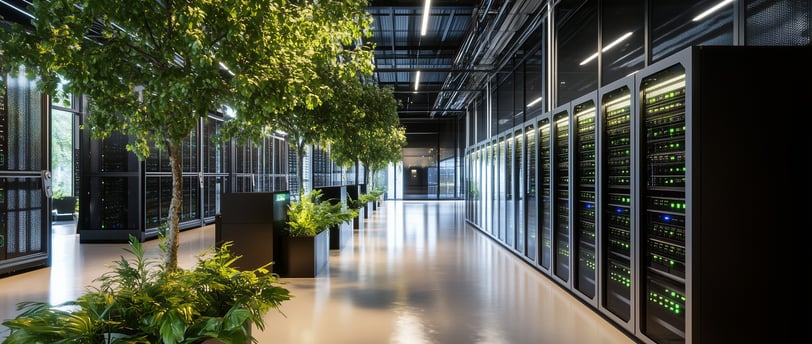AI For Environmental Sustainability
Transforming the Future of Our Planet
AI (ARTIFICIAL INTELLIGENCE)


Artificial intelligence (AI) is not just reshaping how industries operate around the globe; it is also playing a pivotal role in fostering environmental sustainability. As our planet grapples with the alarming effects of climate change, dwindling resources, and escalating pollution, AI-driven solutions are emerging as vital allies in the quest to tackle these formidable challenges. This blog delves into the myriad ways AI is propelling sustainability initiatives, ultimately creating a greener, more efficient world for future generations.
AI in Climate Change Mitigation
In the battle against climate change, AI serves as a powerful tool for predictive analytics and real-time monitoring, enabling more informed decision-making. Some of the key applications include:
- Carbon Footprint Reduction: Advanced AI-powered energy management systems intelligently track and optimize electricity consumption across homes, industries, and urban environments. By identifying inefficiencies and curtailing unnecessary waste, these smart systems significantly lower overall carbon emissions.
- Climate Modeling: Utilizing machine learning algorithms, AI can process and analyze vast datasets related to climate patterns, enhancing the precision of climate predictions. This improved accuracy plays a crucial role in disaster preparedness, allowing communities to better brace for extreme weather events.
- Emissions Tracking: Satellite-based AI models diligently monitor greenhouse gas emissions, offering valuable insights that help governments and organizations enforce environmental regulations and commitments more effectively.
AI for Sustainable Agriculture
With a rapidly growing global population, the need for sustainable agricultural practices has never been more urgent. AI is revolutionizing this sector by boosting agricultural productivity while minimizing adverse environmental impacts through:
- Precision Farming: AI-driven sensors and drones collect real-time data on various parameters such as soil health, crop conditions, and water usage. This allows farmers to make informed decisions that reduce resource wastage and enhance yield.
- Pest and Disease Detection: Leveraging AI-powered image recognition technology, farmers can identify plant diseases and pest infestations in their early stages. This proactive approach not only prevents significant crop losses but also diminishes reliance on harmful chemical pesticides.
- Smart Irrigation Systems: Automated irrigation systems powered by AI utilize data analytics to conserve water effectively while ensuring that crops receive optimal hydration, fostering responsible water usage in agriculture.
AI in Waste Management and the Circular Economy
AI is showing remarkable potential in driving waste reduction and resource efficiency by streamlining recycling and waste management processes:
- Automated Waste Sorting: Robotics powered by AI are revolutionizing waste management by sorting recyclable materials from general waste streams with heightened accuracy. This innovation improves recycling rates and alleviates the burden on landfills.
- Supply Chain Optimization: By employing machine learning, businesses can enhance production efficiency, thereby minimizing material waste during manufacturing and logistics processes.
- Predictive Maintenance: AI systems are adept at anticipating equipment malfunctions before they occur. This foresight helps organizations reduce unnecessary machinery replacements, promoting sustainable consumption throughout various industries.
AI for Biodiversity and Conservation
AI is proving to be an invaluable ally in conservation efforts, playing a crucial role in safeguarding endangered species and monitoring vital natural habitats through:
- Wildlife Monitoring: AI-powered camera traps and drones gather invaluable data on animal populations, helping to prevent poaching and combat habitat destruction through continuous surveillance.
- Deforestation Detection: By analyzing satellite imagery, AI can swiftly identify instances of illegal deforestation and aid in the strategic planning of reforestation efforts, essential for maintaining ecological balance.
- Marine Ecosystem Protection: Innovative AI models assess ocean health by meticulously tracking pollution levels and identifying shifts in marine biodiversity, helping to safeguard these critical ecosystems.
The Future of AI and Sustainability
The convergence of AI and environmental sustainability holds tremendous promise for cultivating a cleaner, more resilient world. As technological advancements continue to unfold, AI-driven solutions will further enhance efficiency, drive down emissions, and promote responsible resource management practices.
Nevertheless, it is crucial to address the ethical considerations that accompany this transformative technology, ensuring that AI deployment aligns harmoniously with environmental and social priorities. By encouraging collaboration among governments, businesses, and research institutions, AI can be harnessed as a formidable instrument for advancing sustainable development, ultimately paving the way for a more harmonious coexistence between humanity and the planet.
